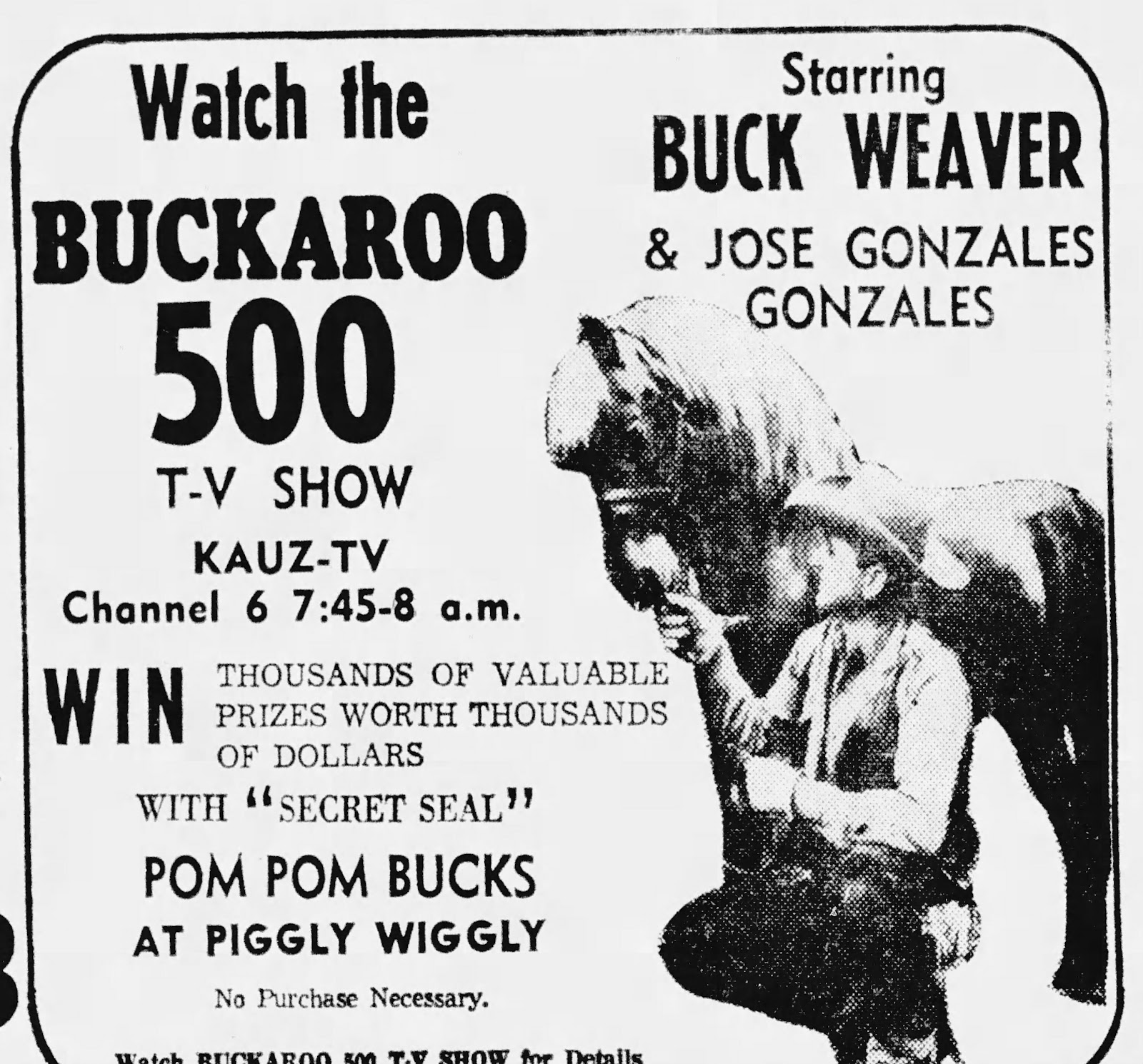One almost-forgotten relic of this era is a little book someone recently gave me: Pom Pom, by Louis Schutter and Norma Youngberg. The book has a copyright date of 1965, by Leonard “Buck” Weaver.
Originally from Nevada, Weaver moved to Los Angeles to produce and star in a syndicated cowboy-themed TV show in the
mid-1960s called “Buckaroo 500.” Like many other cowboy themed children's television programs, "Buckaroo 500" focused on “clean living, respect for adults, and high moral attitude.” The program aired on stations in several states around the country, including large and smaller markets in California.
Weaver's biography on his YouTube channel says:
... The show starred Weaver, his stallion named Pom Pom, and a Doberman named Dixie. The show promotes positive values in children, with emphasis on "doing the right things". The title of the show is based on a score card that Buck developed to be used by children in upgrading themselves to become better human beings. Points can be earned for such things as saying daily prayers, being respectful, and brushing their teeth - hence the 500 in the name.
Weaver, a 1947 Nevada Golden Gloves boxer, also established the Nevada Youth Boys Ranch in his hometown of Fallon, NV. The ranch offered a home for wayward boys ages 11 to 18. Weaver's goal was to help direct them to a more positive lifestyle.
Following in the tradition of books like National Velvet, the book Pom Pom focuses on the relationship between a girl and her horse -- in this case, Weaver's daughter Kathy.
As he was in the book, Pom Pom the pony was, as far as kids were concerned, the real star of Weaver's TV show. He was variously described as a "wild stallion," a "trained stallion," and a "Welsh Pony." (He looks not unlike a typical Shetland Pony from that era.)
"Buckaroo 500" was, at one point, sponsored by Wonder Bread. This retrospective video on YouTube shows an episode where Pom Pom attempted to eat a loaf of bread during filming.
By watching the TV program, viewers could win free ponies and other merchandise. This marketing of Pom Pom in the mid-1960s was a smaller version of the mass marketing campaigns that surrounded other, better-known television programs with horses, like Roy Rogers, in the 1950s and early 1960s.
 |
Pom Pom himself made personal appearances around California to promote the TV series by connecting it to local businesses and educational institutions.
 |
| St. Helena, California Star, April 30, 1964 |
It wasn't uncommon for free pony rides to be offered at the many shopping centers, gas stations, and other businesses being built to support the influx of families to California after World War II.
Sometimes Pom Pom's appearances helped promote the opportunity for a child to ride a different pony.
 |
| Salinas Californian, April 22, 1964 |
Other merchandise, including a coloring book, promoted the life and adventures of Pom Pom. In 1967, Weaver developed a marketing relationship with some Piggly Wiggly grocery stores in Oklahoma, Texas, and New Mexico.
 |
| Silver City, NM Daily Press, June 5, 1967 |
 |
| Silver City, NM Daily Press, June 5, 1967 |
 |
| Las Cruces, NM Sun-News, June 8, 1967 |
Weaver’s and Pom Pom's co-star on the
show was singer and character actor Jose Gonzales-Gonzales. He appeared in a number
of television programs and films, and was a regular performer at the Los Angeles County Fair and other California venues.
An updated version of the story of Pom Pom was published more recently. (Used copies are available for less than $10.)
____
Here's a link to a short 2018 interview with Buck Weaver at the Nevada magazine website:
Jose Gonzales Gonzales' biography is on Wikipedia:












No comments:
Post a Comment